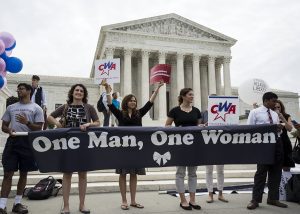WASHINGTON (OSV News) – About a decade after the Supreme Court issued its landmark ruling in Obergefell v. Hodges, overturning state laws defining marriage as the union of a man and a woman, the justices have been directly asked to overturn the ruling that legalized same-sex marriage nationwide. The justices will have to decide whether or not to take up the case in the fall.
Kim Davis, the former Kentucky county clerk who sparked a national controversy in the wake of that ruling in 2015 when she declined to issue a marriage license to a same-sex couple on religious grounds, sought to appeal a federal jury’s decision that she should pay $100,000 in damages — and $260,000 for attorneys fees — to the couple.
In a petition for writ of certiorari filed in July, Davis and her attorneys argued the First Amendment should protect Davis from personal liability for denying marriage licenses, since the suit was filed in her personal rather than official capacity.

“The case actually raises two questions, one: the First Amendment Defense for Kim Davis, based on the free exercise of religion, and two, that Obergefell should be reconsidered and overturned,” Mathew Staver, founder and chairman of Liberty Counsel, the firm representing Davis, told OSV News. He expressed optimism about the court considering the case.
However, Rick Garnett, a professor of law at the University of Notre Dame in Indiana, told OSV News, “It is very unlikely that the Court is going to review a jury’s damages verdict in a case with these facts.”
“Among other things, it is not the case that the First Amendment’s religious-liberty guarantees authorize or protect the actions taken by Ms. Davis,” he said.
Since the Obergefell ruling was issued, Gallup polling has found that support for same-sex marriage among U.S. adults has increased from 58% in 2015 to 68% in 2025.
Gallup, however, found that among those who attend church services weekly only 33% said they believed same-sex marriage should be valid and 24% held that “gay/lesbian relations are morally acceptable.”
Regarding marriage, the Catholic Church teaches the sacrament of matrimony can only take place between one woman and one man as “a permanent union of persons capable of knowing and loving each other and God” ordered to “the good of the spouses” and the gift of children. At the same time, the church stresses that those experiencing same-sex attraction, like Christians in every state of life, are called to live chastely through prayer and sacramental grace, drawing on “the virtues of self-mastery that teach them inner freedom” as they pursue holiness.
William Powell, senior counsel for the Institute for Constitutional Advocacy and Protection, which has represented David Ermold and David Moore, the Kentucky couple to whom Davis denied a license, said in a statement provided to OSV News, “Not a single judge on the U.S. Court of Appeals showed any interest in Davis’s rehearing petition, and we are confident the Supreme Court will likewise agree that Davis’s arguments do not merit further attention.”
Davis was jailed for several days in 2015 for her refusal to issue marriage licenses to same-sex couples, but was released after her staff did so on her behalf and without her name on the forms. The Kentucky Legislature later enacted a law removing the names of all county clerks from marriage licenses issued by the commonwealth.
Staver argued Davis has unique standing to challenge the Obergefell ruling, calling her a “victim” of it.
“It’s because of Obergefell, when it came down, that she asked for an accommodation to have her name removed (from marriage licenses),” Staver said. “When that accommodation wasn’t granted, then she faced a federal lawsuit by the plaintiffs, and then was put in prison for six days, and now she has a judgment against her personally for exercising or requesting to have her religious beliefs accommodated, so she clearly has been injured by Obergefell.”
In the Supreme Court’s decision in Dobbs v. Jackson Women’s Health Organization, which overturned the court’s previous abortion precedent, Justice Clarence Thomas filed a concurrence in that case, in which he argued the justices should “reconsider all of this Court’s substantive due process precedents,” including Obergefell, an argument Davis’ petition cited.
Notre Dame’s Garnett, however, doubted the high court would take the case.
“Even if it were the case that a majority of the justices were interested in finding a vehicle for revisiting Obergefell, it is very unlikely that any of them would think that this particular case is a good vehicle for doing so.”
“There are a number of complicated legal questions — separate from the correctness of Obergefell — in play, that the justices, and their clerks, will think make the case a bad vehicle,” he said.
If the Obergefell ruling were to be overturned in the future, it would not render void existing marriage licenses under the 2022 Respect for Marriage Act. That law requires the federal government to guarantee recognition of existing same-sex and interracial marriages regardless of any changes in law.
